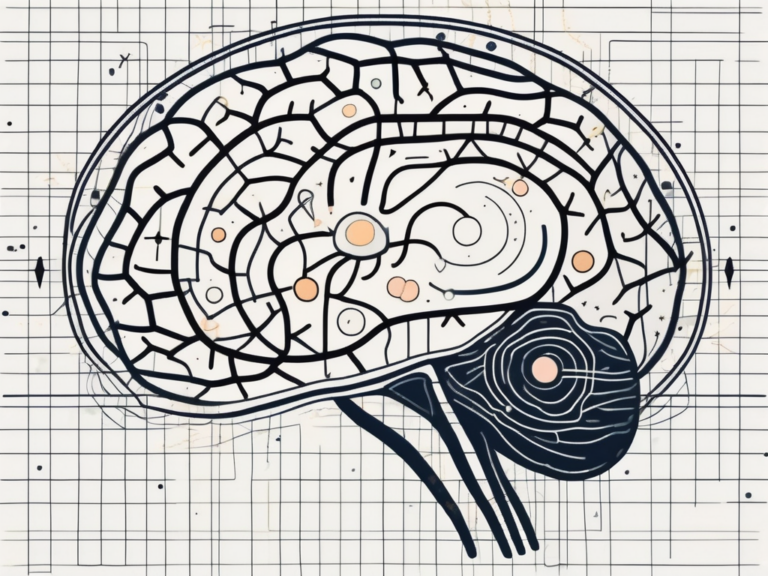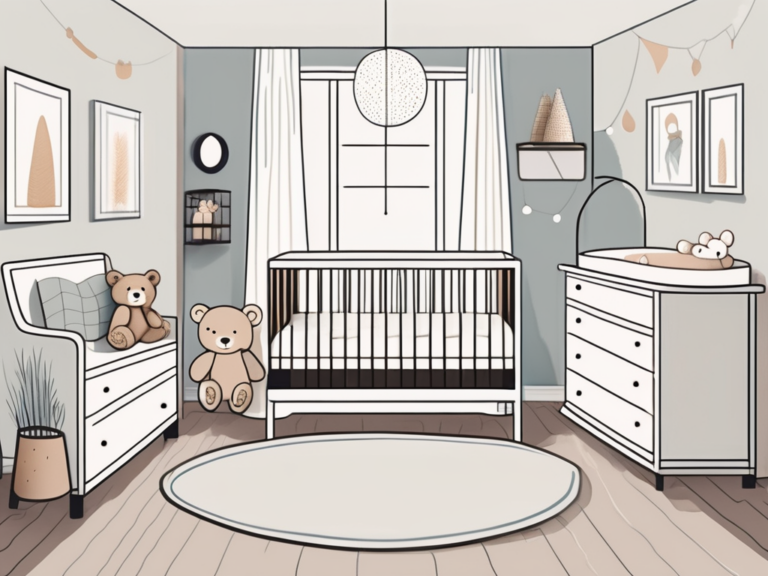Vestibular Nerve and Sleeping
If you’ve ever experienced sleep difficulties or struggles with balance and spatial awareness, you may be surprised to learn that the vestibular nerve plays a crucial role in both of these areas. Understanding the vestibular nerve and its impact on sleep can provide insight into potential solutions for those experiencing sleep disturbances related to vestibular disorders. In this article, we will explore the anatomy and function of the vestibular nerve, its connection to balance and spatial orientation, the impact on sleep quality, available treatment options, and future research directions in this fascinating field.
Understanding the Vestibular Nerve
Before delving into the relationship between the vestibular nerve and sleep, it’s important to have a basic understanding of this complex neural pathway. The vestibular nerve is a branch of the vestibulocochlear nerve, also known as the eighth cranial nerve. It originates in the inner ear and carries sensory information related to balance and spatial orientation to the brain. This information helps us maintain stability, judge distances, and perceive our body’s position in space.
Anatomy of the Vestibular Nerve
The vestibular nerve is composed of two main components: the superior and inferior vestibular nerves. The superior vestibular nerve primarily carries information related to head movements, while the inferior vestibular nerve focuses on detecting changes in linear acceleration and gravity. These two branches work in harmony to provide a comprehensive understanding of our body’s position in relation to our surroundings.
Moreover, within the inner ear, the vestibular nerve is closely associated with the semicircular canals, which are fluid-filled structures responsible for detecting rotational movements of the head. This intricate connection allows for the precise transmission of information regarding angular acceleration and deceleration, crucial for maintaining balance and coordinating movements.
Function of the Vestibular Nerve
The vestibular nerve works in conjunction with other sensory systems, such as vision and proprioception, to maintain equilibrium. When the head moves, signals are sent from the vestibular organs in the inner ear to the brain, which interprets and integrates this information. This complex process allows us to adjust our posture, stabilize our gaze, and adapt to changes in our environment.
Furthermore, the vestibular nerve plays a vital role in reflex mechanisms that help prevent falls and maintain stability. For instance, the vestibulo-ocular reflex ensures that our eyes remain fixed on a target while we move our head, enhancing visual acuity and reducing blurring during motion. This intricate interplay between the vestibular system and other sensory modalities showcases the remarkable adaptability and precision of our neural networks.
The Role of the Vestibular Nerve in Balance and Spatial Orientation
Now that we have a foundational understanding of the vestibular nerve, let’s explore how it relates to our sense of balance and spatial awareness.
The vestibular nerve, also known as the eighth cranial nerve, is a critical component of the vestibular system, which is responsible for maintaining equilibrium and spatial orientation. This nerve transmits sensory information from the vestibular organs located in the inner ear to the brainstem, allowing for the perception of head position and movement.
Vestibular Nerve and Body Equilibrium
The vestibular nerve plays a vital role in maintaining body equilibrium by detecting changes in head position and movement. When the head tilts or rotates, the vestibular organs provide the brain with real-time information about the direction and speed of these movements. This information allows the brain to make rapid adjustments to muscle tone and posture, ensuring that we remain upright and stable.
Furthermore, the vestibular nerve is interconnected with other sensory systems, such as the visual and proprioceptive systems, to coordinate balance responses. This integration of sensory inputs enables us to adapt to various environmental conditions and perform complex motor tasks with precision.
Vestibular Nerve and Spatial Awareness
In addition to balance, the vestibular nerve also contributes to our spatial awareness. By providing information about the angle and direction of our head movements, the vestibular organs help us navigate and perceive our environment accurately. This ability is particularly crucial for activities that require precise coordination and spatial judgment, such as driving, sports, and even simple tasks like walking up and down stairs.
Moreover, the vestibular system plays a role in the perception of verticality and gravitational forces, allowing us to maintain a stable perception of the world around us. Dysfunction of the vestibular nerve can lead to symptoms such as vertigo, dizziness, and impaired spatial orientation, highlighting the importance of this sensory pathway in our daily lives.
Connection Between the Vestibular Nerve and Sleep
While the link between the vestibular nerve and balance is well established, the impact on sleep quality is a relatively newer area of research. However, emerging evidence suggests that vestibular disorders can significantly influence sleep patterns and overall sleep quality.
Understanding the intricate relationship between the vestibular nerve and sleep can shed light on the complex nature of our body’s physiological processes. The vestibular system, responsible for maintaining balance and spatial orientation, also plays a crucial role in regulating sleep-wake cycles. Disruptions in this system can have far-reaching effects beyond just balance, extending into the realm of sleep health.
Impact of Vestibular Nerve on Sleep Quality
Individuals with vestibular disorders often report difficulties falling asleep, staying asleep, or experiencing restful sleep. The disruptions in the vestibular system can lead to feelings of dizziness, vertigo, and unsteadiness, which can persist even when lying down. These symptoms can make it challenging to find a comfortable sleeping position and may result in frequent awakenings throughout the night.
Moreover, the relationship between the vestibular nerve and sleep quality is bidirectional, with poor sleep further exacerbating vestibular symptoms. Sleep deprivation can increase feelings of dizziness and imbalance, creating a vicious cycle that impacts both physical and mental well-being. Addressing sleep disturbances in individuals with vestibular disorders may not only improve their quality of life but also potentially alleviate some of the vestibular-related symptoms they experience.
Vestibular Nerve Disorders and Sleep Disturbances
Several vestibular nerve disorders can contribute to sleep disturbances. Conditions such as Meniere’s disease, vestibular neuritis, and benign paroxysmal positional vertigo (BPPV) can all cause recurring episodes of dizziness and vertigo, disrupting normal sleep patterns. Additionally, vestibular migraine, a type of migraine headache that affects the vestibular system, can lead to both daytime dizziness and sleep disturbances.
Exploring the interplay between these vestibular disorders and sleep disturbances unveils the intricate web of connections within the human body. By delving deeper into these relationships, researchers and healthcare professionals can develop more targeted interventions to improve both vestibular health and sleep quality for individuals affected by these conditions.
Treatment Options for Vestibular Nerve Disorders Affecting Sleep
While addressing the underlying cause of vestibular nerve disorders is essential, there are various treatment options available to help manage sleep disturbances associated with these conditions. It’s important to note that each treatment plan should be tailored to the individual’s specific needs and under the guidance of a medical professional.
Medication and Therapy for Vestibular Nerve Disorders
In some cases, medications such as vestibular suppressants or anti-anxiety drugs may be prescribed to alleviate symptoms and improve sleep quality. These medications work by reducing the activity of the vestibular system, which can help to decrease dizziness and vertigo, allowing for a more restful sleep. However, it’s important to note that medication should always be used under the supervision of a healthcare provider, as they can have potential side effects and interactions with other medications.
In addition to medication, vestibular rehabilitation therapy can also be beneficial for individuals with vestibular nerve disorders. This form of physical therapy focuses on improving balance and reducing dizziness through a series of exercises and techniques. By retraining the brain to process vestibular information more effectively, this therapy can result in improved balance and reduced symptoms, ultimately leading to better sleep quality.
Lifestyle Changes to Improve Vestibular Health and Sleep
Alongside medical intervention, making certain lifestyle changes can help improve vestibular health and promote better sleep. Engaging in regular exercise, such as walking or swimming, can help to strengthen the muscles that support the vestibular system, leading to improved balance and reduced symptoms. Additionally, maintaining a balanced diet that includes foods rich in vitamins and minerals, such as fruits, vegetables, and whole grains, can support overall vestibular health.
Managing stress levels is also crucial for individuals with vestibular nerve disorders, as stress can exacerbate symptoms and disrupt sleep. Incorporating stress management techniques into daily life, such as deep breathing exercises, meditation, or engaging in hobbies and activities that promote relaxation, can help to reduce stress levels and improve sleep quality.
Creating a sleep-friendly environment is another important aspect of managing sleep disturbances associated with vestibular nerve disorders. Ensuring a comfortable bed with proper support can help to alleviate any discomfort or pain that may be contributing to sleep difficulties. Minimizing noise and light disturbances in the bedroom, such as using earplugs or a sleep mask, can also promote a more restful sleep. Additionally, implementing a consistent bedtime routine, which may include activities such as reading a book or taking a warm bath, can signal to the body that it is time to wind down and prepare for sleep.
In conclusion, while there is no one-size-fits-all approach to managing sleep disturbances caused by vestibular nerve disorders, a combination of medication, therapy, and lifestyle changes can help to alleviate symptoms and improve sleep quality. It is important to work closely with a medical professional to develop an individualized treatment plan that addresses the specific needs and challenges of each individual. With the right approach, it is possible to achieve restful sleep and improve overall well-being despite vestibular challenges.
Future Research Directions in Vestibular Nerve and Sleep Studies
While significant progress has been made in understanding the relationship between the vestibular nerve and sleep, there is still much to uncover. Ongoing research aims to explore potential innovations in vestibular nerve treatments and identify unexplored areas in the field of vestibular nerve and sleep research.
Potential Innovations in Vestibular Nerve Treatments
Advancements in technology, such as virtual reality and wearable devices, hold promise for improving vestibular rehabilitation therapy. These innovations may provide more personalized and targeted interventions, allowing individuals to regain balance and reduce sleep disturbances more effectively.
Imagine a future where individuals with vestibular disorders can undergo virtual reality-based therapy sessions in the comfort of their own homes. With the help of immersive environments and motion-sensing devices, patients could engage in simulated activities that challenge their vestibular system and promote recovery. These personalized therapy programs would adapt to the individual’s progress, ensuring optimal outcomes and minimizing the disruption to their daily lives.
Furthermore, wearable devices equipped with sensors and algorithms could continuously monitor an individual’s vestibular function and sleep patterns. By collecting real-time data, these devices could provide valuable insights into the relationship between vestibular health and sleep quality. This information could then be used to develop targeted interventions, such as customized exercise programs or sleep hygiene recommendations, to address specific vestibular and sleep-related issues.
Unexplored Areas in Vestibular Nerve and Sleep Research
Further research is needed to fully understand the intricate relationship between the vestibular nerve and sleep. Exploring factors such as the role of circadian rhythms, the impact of vestibular disorders on sleep architecture, and the potential connection between sleep disorders and the exacerbation of vestibular symptoms can provide valuable insights into this complex interaction.
For instance, investigating the influence of circadian rhythms on vestibular function and sleep could uncover new strategies for managing vestibular disorders. Understanding how the body’s internal clock affects the vestibular system and sleep-wake cycles may lead to the development of chronotherapy approaches, where treatments are administered at specific times to optimize their effectiveness.
Additionally, exploring the impact of vestibular disorders on sleep architecture could shed light on the underlying mechanisms that contribute to sleep disturbances. By analyzing sleep stages, brain activity, and physiological parameters in individuals with vestibular disorders, researchers could identify patterns and abnormalities that may help guide targeted interventions.
Moreover, investigating the potential connection between sleep disorders and the exacerbation of vestibular symptoms could provide valuable insights into the bidirectional relationship between these two domains. Understanding how sleep disturbances can influence vestibular function and vice versa may lead to more comprehensive treatment approaches that address both aspects simultaneously.
In conclusion, the vestibular nerve plays a crucial role not only in maintaining balance and spatial orientation but also in influencing sleep quality. Understanding the connection between the vestibular nerve and sleep disturbances can pave the way for targeted treatment options and improved management of vestibular disorders. While medical intervention and therapy can provide relief, incorporating lifestyle changes that support vestibular health and implementing sleep-friendly practices can contribute to better sleep outcomes. As research in this field progresses, it is hopeful that innovative solutions will emerge, benefiting those affected by vestibular disorders and sleep disturbances alike.






